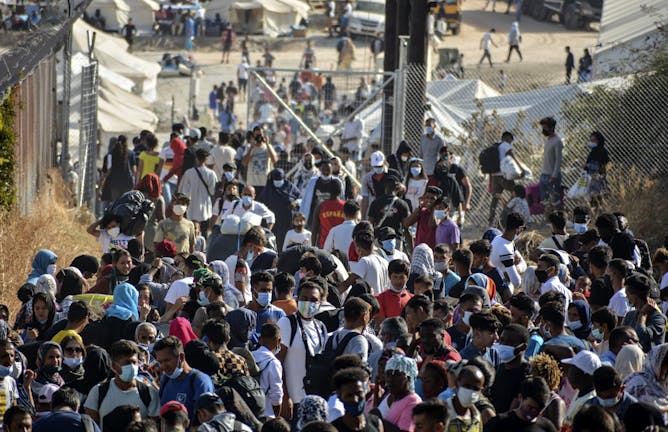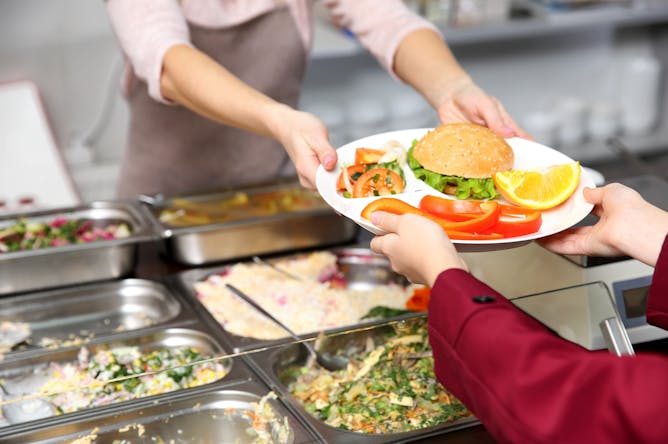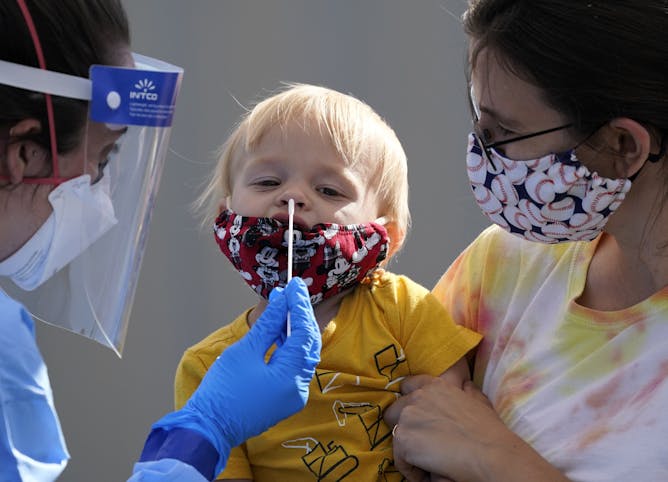|
|
|
|
A month ago, a fire ripped through the notoriously unsafe Moria refugee camp in Lesbos, Greece, leaving thousands of refugees homeless and forcing them to a makeshift, temporary camp. But living conditions at the new camp are equally grim, and the COVID-19 pandemic is making the plight of refugees even more frightening. Petra Molnar and Kenya-Jade Pinto of the Refugee Law Lab at York University recently returned from the camp and share their insight in today’s The Conversation Canada.
They write: “Just imagine how terrifying it would be to be detained in bunk beds with strangers and no running water, monitored by an omnipresent government, with nowhere to wash, bathe or properly disinfect amid a pandemic that’s killed more than a million people — and stuck in a violent migration system for years with no end in sight.”
Also in today’s edition:
Regards,
|
Lee-Anne Goodman
Politics, Business + Economics Editor
|

|
|

Migrants, most of them wearing face masks to protect against the spread of COVID-19, gather outside the temporary refugee camp in Kara Tepe as they wait to depart from Lesbos for mainland Greece on Sept. 28, 2020.
(AP Photo/Panagiotis Balaskas)
Petra Molnar, York University, Canada; Kenya-Jade Pinto, York University, Canada
In the middle of a windswept refugee camp in the aftermath of the burning of Moria, the COVID-19 pandemic is an afterthought.
|

School food programs can also serve children’s critical social and emotional needs.
(Shutterstock)
Sinikka Elliott, University of British Columbia; Jennifer Black, University of British Columbia
School food programs should be key elements of governments' COVID-19 responses. In planning these, the relationships that are part of providing food matter.
|

One-year-old Quentin Brown is held by his mother, Heather Brown, as he eyes a swab while being tested for COVID-19 at a new walk-up testing site at Chief Sealth High School in Seattle on Aug. 28, 2020.
(AP Photo/Elaine Thompson)
Kathryn Birnie, University of Calgary; Meghan McMurtry, University of Guelph
Child health psychologists offer research-based strategies to prepare kids for pain-free and distress-free COVID-19 testing.
|
La Conversation Canada
|

La recherche faite par les femmes, souvent plus qualitative, est plus vulnérable aux effets du confinement.
shutterstock
Louise Champoux-Paillé, Concordia University; Anne-Marie Croteau, Concordia University
Comme le poids des tâches familiales est davantage porté par les femmes, les professeures peinent à dégager la marge de manœuvre nécessaire à la production d’articles scientifiques.
|

Cela fait 15 ans que les Normes internationales d’information financière (IFRS) ont été adoptées pour rendre comparables les informations financières d’un pays à un autre, et faciliter l’exercice de consolidation des états financiers par des multinationales.
Shutterstock
Félix Zogning, Université du Québec en Outaouais (UQO)
Certains pays se soumettent maintenant exclusivement aux Normes internationales, alors que ce référentiel ne tient pas toutes ses promesses d’une meilleure information financière.
|
Business + Economy
|
-
John Hawkins, University of Canberra
For their work on auctions and 'the winner's curse', Stanford neigbhours Paul Milgrom and Robert Wilson have won the 2020 Nobel Prize for economics.
|
|
Environment + Energy
|
-
Roger Bales, University of California, Merced; Martha Conklin, University of California, Merced
Restoring western forests – thinning out small trees and dead wood – is an important strategy for reducing the risk of massive wildfires. But these projects aren't fast, easy or cheap.
|
|
Science + Technology
|
-
Elis Newham, University of Bristol; Pam Gill, University of Bristol
New study used X-rays of the teeth of early mammals' to show they were more like cold blooded reptiles.
|
|
| |
| |
| |
| |
| |
| |
|
|
|
|
|
|
|